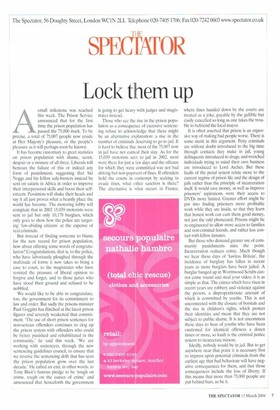Lock them up
Asmall milestone was reached this week. The Prison Service announced that for the first time the prison population has passed the 75,000 mark. To be precise, a total of 75,007 people now reside at Her Majesty's pleasure, or the people's pleasure as it will perhaps soon be known.
It has become customary to greet statistics on prison population with shame, scorn, despair or a mixture of all three. Liberals will bemoan the failure of this or indeed any form of punishment, suggesting that Sid Noggs and his fellow safe-busters instead be sent on safaris in Africa in order to improve their interpersonal skills and boost their selfesteem. Pessimists will shake their heads and say it all just proves what a beastly place the world has become. The motoring lobby will complain that in 2002 15,039 motorists were sent to jail but only 10,178 burglars, which only goes to show how the police are targeting law-abiding citizens' at the expense of real criminals.
But instead of finding someone to blame for the new record for prison population, how about offering some words of congratulation? Congratulations, that is, to the police, who have laboriously ploughed through the multitude of forms it now takes to bring a case to court, to the magistrates who have resisted the pressure of liberal opinion to forgive and forget, and to those juries who have stood their ground and refused to be nobbled.
We would like to be able to congratulate, too. the government for its commitment to law and order. But sadly the prisons minister Paul Goggins has flinched at the latest prison figures and severely weakened that commitment. 'The use of short prison sentences for non-serious offenders continues to clog up the prison system with offenders who could be better punished and rehabilitated in the community,' he said this week. 'We are working with sentencers, through the new sentencing guidelines council, to ensure that we reverse the sentencing drift that has seen the prison population grow over the last decade.' He called an end, in other words, to Tony Blair's famous pledge to be 'tough on crime, tough on the causes of crime' and announced that henceforth the government is going to get heavy with judges and magistrates instead.
Those who see the rise in the prison population as a consequence of excessive sentencing refuse to acknowledge that there might be an alternative explanation: a rise in the number of criminals deserving to go to jail. It is hard to believe that most of the 75,007 now in jail have not earned their stay. As for the 15,039 motorists sent to jail in 2002, most were there for just a few days and the offence for which they were committed was not bad driving but non-payment of fines. If offenders hold the courts in contempt by seeking to evade fines, what other sanction is there? The alternative is what occurs in France, where fines handed down by the courts are treated as a joke, payable by the gullible but easily cancelled so long as one takes the trouble to befriend the local mayor.
It is often asserted that prison is an expensive way of making bad people worse. There is some merit in this argument. Petty criminals are without doubt introduced to the big time through contacts they make in jail, young delinquents introduced to drugs, and wretched individuals trying to mind their own business are introduced to Lord Archer. But these faults of the penal system relate more to the current regime of prison life and the design of jails rather than the principle of incarceration itself. It would save money, as well as improve prisoners' aspirations, were their access to DVDs more limited. Greater effort might be put into finding prisoners more profitable work while they are inside, so that they learn that honest work can earn them good money, not just the odd phonecard. Prisons might be re-engineered to allow more access to families and non-criminal friends, and rather less contact with fellow inmates.
But those who demand greater use of community punishments miss the point. Incarceration reduces crime. Much though we hear these days of 'lawless Britain', the incidence of burglary has fallen in recent years as more burglars have been jailed. A burglar banged up in Wormwood Scrubs cannot come round and steal your video; it is as simple as that. The crimes which have risen in recent years are robbery and violence against the person, a disproportionate amount of which is committed by youths. This is not unconnected with the closure of borstals and the rise in children's rights, which protect their identities and mean that they are not subject to public shame. It is not uncommon these days to hear of youths who have been cautioned for identical offences a dozen times or more, so loath is the criminal justice system to incarcerate minors.
Ideally, nobody would be in jail. But to get anywhere near that point it is necessary first to impress upon potential criminals from the earliest age that bad behaviour will have negative consequences for them, and that those consequences include the loss of liberty. If this means that more than 75.000 people are put behind bars, so be it.


































































 Previous page
Previous page